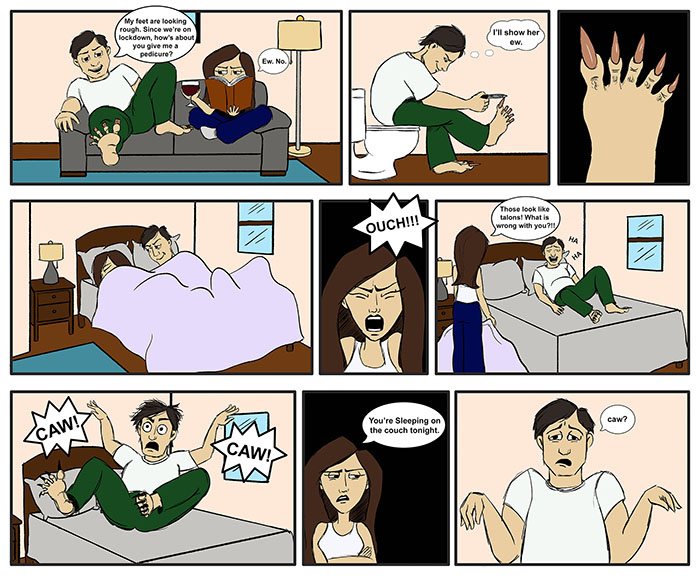ILL 206: Cartooning and Sequential Art
Develop your storytelling skills in cartoon art
The great cartoon artists know how to tell a story with one image. In this online cartooning course, you'll explore concepts for visual storytelling. Working with a veteran cartoonist, you'll discover how master cartoonists tell stories simply and effectively and apply what you learn in practical projects that help you grow your sequential art portfolio. Course topics include panel transitions, time and motion effects, character studies, speed drawing, and polishing and presenting your work to publishers.
 Student work by Kristy Ren Hayzlett.
Student work by Kristy Ren Hayzlett. Visit the Student Gallery.
About This Course
Project-Based Learning
Creative course projects task you with developing short comic sketches, scripts and sequences, with an emphasis on character development and storytelling.
What Skills Will I Develop?
Students in this course can expect to learn to:
- Generate interesting visual ideas for cartoon art through brainstorming.
- Use an online image search as reference material for your drawings.
- Create character studies through live sketching in a public space.
- Use the six typical panel transitions in an effective and appropriate manner.
- Develop short psychological profiles for your characters.
- Apply concepts and techniques for expressing time and motion.
- Basic ability to polish and ink your cartooning work for presentation.
- Develop a basic character bible style reference sheet showing characters with a variety of poses and emotions.
- Create side-by-side proportional drawings of a set of characters.
- Create stories through quick, effective composition choices.
- Utilize speed drawing techniques as a way to generate ideas for more polished artwork.
- Make effective use of speech balloons and consistent use of lettering.
- Promote your cartoon stories through the selection and presentation of your artwork.
- Create a compelling cartoon project pitch with a project title, description, character bible, two representative scenes, and three stories.
- Exhibit skill in visual storytelling through character sketches, panel transitions, time and motion techniques.
What Software and Supplies Do I Need?
- Computer with Internet connection.
- Adobe Illustrator CS6 or CC.
- Various drawing supplies as desired.
- Basic experience in drawing and the above software.
.
Course Outline
Generating Visual Ideas
We will explore the beginning stage of developing ideas for scenes. I'll show you my process for getting ideas on paper and discuss some of the drawing tools and materials you can use for this course.
Telling a Story With Multiple Panels
In this week's class we are going to focus on how to connect one panel in a cartoon art project to the next. The technical term for this is panel transitions. We will define six different types of panel transitions you can use, show you examples of each type, and break down how it all works.
Working With Time
In this lecture, we're going to work on the concept of manipulating time even further. As we'll discover, time can be stretched in a single panel in multiple ways. Doing that effectively can add drama and storytelling power to each frame that you create.
Creating Believable Characters
Here we'll look at how to develop your characters from a psychological standpoint, and discuss how the psychology of your characters affects their design. We'll look at several examples of "character bibles" to see how artists develop their character designs over time.
Picking Your Shots
In this lecture we'll examine a couple of ways you can make your stories clearer. We will explore 21 classic shots used by cartoon artists (and they are classics for a reason.) And we'll examine how drawing quickly can actually make your compositions and shot selections more effective.
Finishing Touches and Presenting Your Work
In this final lecture we'll explore some of the finishing touches for making your work look professional, including speech balloons, lettering, and inking.
Frequently Asked Questions (FAQ)
How Do The Courses Work?
Our courses are project-based and instructor-led. In each course you’ll complete a series of lectures, projects, discussions, and critiques designed to stretch your creative skills. Weekly assignment deadlines keep you on track, and with no set-logins or Zoom meetings, you can build your studies around your schedule.
Who Are The Instructors?
Our courses are developed and taught by our industry-leading faculty of creative professionals. This means that you’ll learn in-demand skills, get feedback on your work, and build a portfolio of creative work. View our Student Gallery for featured student projects.
When Can I Start?
Classes start January, April, and August, and this course is completed in a 15-week term. College credit from this course can be applied to a range of Degree and Certificate programs at Sessions College. You can enroll in this course on an individual basis or as part of a program.
Explore our Programs: Bachelor's Degree | Associate Degree | Undergraduate Certificate
How Do I Register?
To register for a program, complete our program application. To register for this course on an individual basis, please contact our admissions team at admissions@sessions.edu. An Admissions Advisor will contact you to setup your enrollment.
| Course Tuition and Fees | |
|---|---|
| Tuition | $510/credit |
| Registration Fee* | $200 |
| Total Course Price | $1730 |
Registration fees are nonrefundable after 5 days from enrollment.
Is Sessions College accredited?
Yes. Since 2001, Sessions College has been accredited by the Distance Education Accrediting Commission (DEAC). The Distance Education Accrediting Commission is listed by the U.S. Department of Education as a recognized accrediting agency and is recognized by the Council for Higher Education Accreditation (CHEA).
